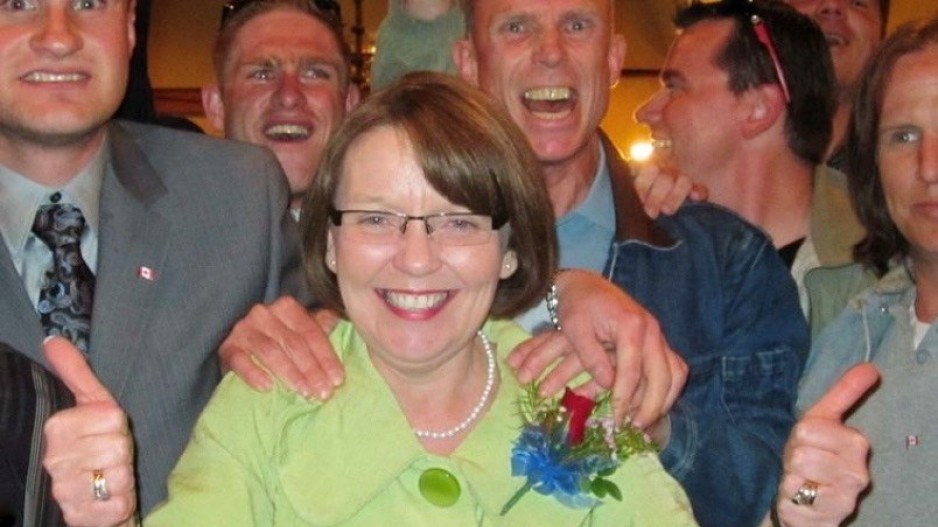The BC NDP wants interim BC Liberal leader Shirley Bond and past party leadership contender Kevin Falcon to explain why residents of a publicly funded treatment centre were being allegedly used in their political campaigns.
“It’s disturbing that the BC Liberals would use residents in a publicly funded recovery facility for their own re-election,” Richmond-Queensborough NDP MLA Aman Singh said April 28.
“Instead of ensuring every dollar goes into addictions supports, we’ve heard that facility staff were campaigning for the BC Liberals. Kevin Falcon and Shirley Bond should publicly disclose everything they know about this situation and explain why they think it’s OK to use public funds for partisan gain,” Singh said.
Elections BC said April 27 there is no apparent contravention of the Election Act and that it would not be investigating.
Bond said she has long been a passionate advocate for and supporter of Baldy Hughes.
“I would never accept or allow anyone to be coerced into supporting a political candidate,” Bond said.
“Government’s job is to provide funding for a range of treatment options for those facing mental health and addictions issues in our province, Bond said. “I advocated for Baldy Hughes ten years ago and will continue to advocate for new resources for mental health and addictions throughout the province today.”
“My connection to Baldy Hughes is, and always has been, about getting people the help they so desperately need by providing an important pathway to treatment and recovery for addictions,” Bond said. “I make no apologies for supporting the Baldy Hughes residents, many of whom were at the lowest point in their lives.”
The Prince George-Valemount MLA said she’s spent many hours at graduation ceremonies, gratitude circles, attending events, visiting their garden, and being part of a program to provide Christmas stockings to residents.
“I’ve witnessed firsthand the difference it makes and getting to know residents who have had their lives turned around by the opportunities Baldy Hughes gave them,” Bond said. “It should come as no surprise that people in my community, myself included, wanted to support a facility that provides hope to men struggling with addictions.”
Falcon said April 28 he had not campaigned at the facility.
“I visited the facility once in July 2010 to deliver a grant cheque to refurbish the kitchen at Baldy Hughes,” he said. “I’m pleased to see the facility continues to provide important addiction recovery work,” Falcon said.
“The allegations of campaign calls by clients have already been denied,” he said.
BHTC is operated by the BC New Hope Recovery Society, which leased the land in “as is” condition in 2007 before Premier Gordon Campbell’s Liberal government bought it in 2010 for $2.2 million over the assessed value.
Men living at BHCT to this day receive intensive addictions counseling, health and fitness instruction, vocational and agricultural instruction and leadership skills lessons. Some consider BHTC a last-chance rehab for individuals entrenched in addiction to get healthy.
However, studies of the land they live on for a year indicate the presence of leaded paint, asbestos and other carcinogens and even uranium or mercury presence dating back to the Cold War
Set against the canvass of B.C.’s ongoing opioid crisis, events occurred as overdose fatalities climbed — from 202 deaths in 2010 to 1,724 last year.
But the men at BHTC have asked for help, attending the centre to turn their lives around.
And, B.C.’s Ministry of Mental Health and Addictions told Glacier Media Jan. 29 “people living with addiction and their families have the right to know that the treatment and supportive recovery services they are accessing are safe. They deserve to receive informed, quality care on their path to recovery — especially at such a vulnerable time in their lives.”
Addiction treatment and recovery are the responsibility of Sheila Malcolmson, the Minister of Mental Health and Addictions. She took over from former minister Judy Darcy, who did not run in 2020’s provincial election.
Malcomson’s November mandate letter from Premier John Horgan stressed moving oversight of “recovery homes and other private treatment providers to Mental Health and Addictions to ensure quality care, accountability and value for money.”



